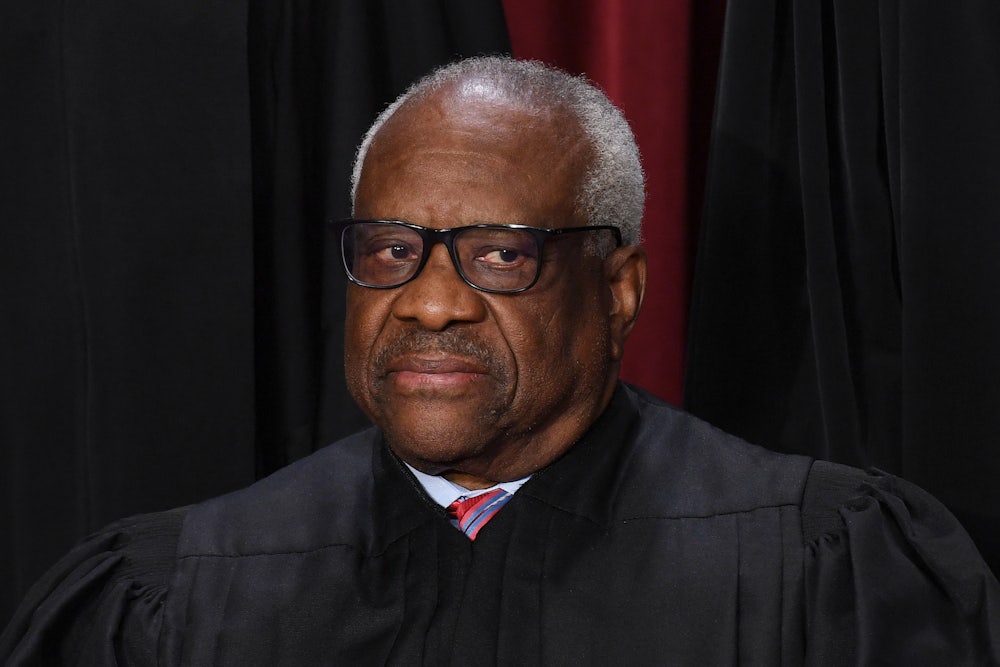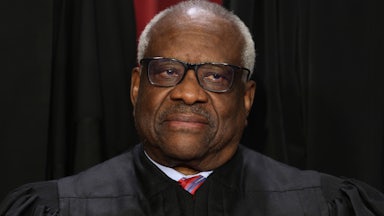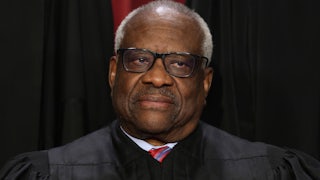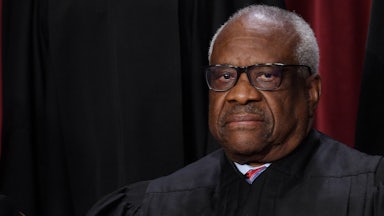For years, Supreme Court Justice Clarence Thomas has accepted lavish gifts and extravagant vacations from Harlan Crow, a right-wing billionaire whose advocacy groups regularly appear before the court. Many of the boons that Crow bestowed upon the justice were the kinds of things you would expect from an insanely rich guy (yacht vacations, flights); others are extremely weird (a bronze statue of a gnome, vacations at Crow’s compound that includes, among other weird things, a replica of Hagrid’s hut from the Harry Potter films); and some are just brazenly corrupt (Crow vastly overpaid when he purchased several properties from Thomas in 2014).
The arrangements that have been assiduously documented by ProPublica over the past week are bad for reasons that are more or less self-evident. It certainly all has the appearance of corruption—it is, generally speaking, not good for a judge to accept so many luxurious trifles from someone who funds groups that sometimes bring cases to their court. It’s undoubtedly another severe blow to the Supreme Court’s reputation, which was already in tatters. That Thomas brazenly refused to report the gifts is fundamentally unethical. The fact that no one is going to do anything about this—not John Roberts and certainly not Congress—only underlines the rot at the heart of two branches of the American government.
Thomas and Crow’s defenders have largely used the same argument to defend both men: Sure, this all may look bad to some, but what everyone is forgetting is that these are good guys—great guys!—and anyway, there’s nothing to see here, just two chums, chumming it up. Cherry-picking the most bombastic accusations—that Crow’s gifts are bribes; that Crow’s huge collection of Nazi memorabilia makes him a “Nazi sympathizer”—they concoct a defense of the men that basically amounts to, “No, they’re not,” in the style of a famous satirical editorial from The Onion. (While I would agree that owning, say, a signed copy of Mein Kampf does not on its own make you a Nazi sympathizer, it seems abundantly clear that Crow’s collection of memorabilia related to totalitarianism and fascism amounts to a wholesale kitschification and trivialization of the horrors of the twentieth century. But I digress.)
Does anyone doubt the sincerity of any justice? Do you think any of them would vote differently on any issue bc of their friends are or which parties they get invited to? Agree or disagree, think an argument is strong or weak, do you really think any of them aren’t sincere?
— Ilya Shapiro (@ishapiro) April 14, 2023
This, from legal scholar Ilya Shapiro of “lesser black woman” fame, is a particularly dumb and obtuse example of this line of argument, but it’s representative of the larger thrust and parry that’s going on among Thomas’s defenders as news of these scandalous dealings continues to emerge. Shapiro’s claim is that Thomas is super conservative and would have voted the way Crow prefers regardless of how many nights the two spent yachting around the Mediterranean. This is probably true; it also doesn’t matter one whit.
Revealingly, Shapiro uses the absolute narrowest definitions of bribery and corruption—essentially arguing that Thomas wasn’t given a briefcase full of bronze gnomes to vote a certain way in a smoke-filled room while both men laughed with sinister intent, so therefore everything is on the up and up. But we can stipulate that it wasn’t Crow’s loot that convinced Thomas to become a right-wing jurist—the idea that this is even up for debate is a rhetorical ploy designed to distract us from the many reasons that Thomas and Crow’s relationship is deeply corrupt.
Thomas may not have deliberately changed his votes at Crow’s behest, but a chummy relationship between a right-wing megadonor who literally funds organizations that appear before the Supreme Court and a justice on that court, involving the bestowing of many lavish gifts—which said justice then hides from the public—is clearly crooked. Crow’s relationship with Thomas is based entirely on the former’s wealth and the latter’s influence. It obviously speaks to Thomas’s own contempt for his critics and opponents: He is identifying as a member and agent of a vast right-wing machine. He is, more importantly, using his position in government to enrich himself—it is obvious that Thomas would not be the beneficiary of Crow’s largesse if he were not on the Supreme Court.
That all of this is amoral on its face should be clear to anyone who values a functional democracy. Having a member of the Supreme Court hobnobbing around and taking all kinds of presents from a billionaire megadonor goes against bedrock principles of self-government. A civic-minded judge or lawmaker labors diligently to avoid even a hint of impropriety; Thomas has done no such thing and instead has gleefully filled his pockets. The idea that Shapiro—or anyone else—knows Thomas’s heart is silly. It’s also irrelevant: We don’t need to connect the dots to determine which bronze gnome wrought which Supreme Court decision. The appearance of a conflict of interest is sin enough.
To accept what Thomas and Crow have cooked up between themselves is to accept rampant corruption on the Supreme Court, full stop. It shows that the court has no ability to police itself and no interest in doing anything that might ameliorate the continued and growing influence of right-wing megadonors on its justices—particularly Thomas. Undoubtedly Crow and Thomas’s close relationship has influenced the justice’s thinking. Surely Crow has expressed his opinions on ideological matters during those many hours they’ve spent together, sunning in the Riviera.
Crow derives a benefit from keeping Thomas steeped in lavish gifts—all that boodle may not be necessary to push Thomas to rule a certain way, but it sure helps influence other people in Crow’s orbit. He can present himself as someone who has the ear of one of the most powerful jurists in the country. He can also send the message that there are rich rewards to be reaped by staying in the plutocrat’s good graces. And so the failure to do anything about Thomas and Crow’s relationship sends a message to right-wing justices everywhere. If you hold the line—and rule in the manner Crow prefers—you too can one day rake in gifts, vacations, playdates, and weird trips to an absurd “park” containing dozens of statues of fallen dictators. Corruption is welcome. Thomas may not have changed any of his votes at Crow’s behest—but that doesn’t mean others won’t.










